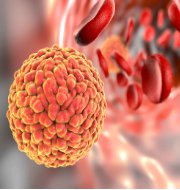Scientists from University of Texas Medical Branch develop world’s first Zika virus clone
Thursday 19th of May 2016

Sharing is caring
Scientists from The University of Texas Medical Branch (UTMB) have developed world’s first genetically engineered clone of the Zika virus strain.
They have dubbed it as infectious complementary DNA (cDNA) clone. It allows researchers to make Zika virus from test tube and cells on petri dishes.
The clone comprises of five fragments of complete zika viral genome which were individually cloned and assembled into the full-length Zika virus clone.
Significance: It will help scientists to quickly develop countermeasures and also to explore evolution of Zika virus and how it spread more quickly.
This biological breakthrough will also aid the development of vaccine and therapies against the infection of vector borne Zika virus which has been linked to serious birth defects.
Other developments
UTMB Scientists also developed mosquito infection models and Zika mouse model which will help in deciphering why the virus is tied to serious diseases.
Furthermore, scientists also engineered a luciferase reporter Zika virus. Luciferase is the chemical in fireflies that gives them their signature glow.
The glowing reporter virus will be used for antiviral drug screening and to track Zika virus infection in the host Aedes aegypti mosquitoes and small animal models.
More about Zika virus
Zika virus is a mosquito-borne virus transmitted by Aedes aegypti mosquitoes.
Virus family: Flaviviridae.
Genus: Flavivirus. The virus was first identified in 1947 in Uganda and its name has been derived from Zika Forest.
Transmission: Zika virus is not contagious but it is mainly transmitted by daytime-active Aedes aegypti mosquitoes after it bites someone infected with the virus and transmit it by biting another human.
Symptoms: Headache, muscle and joint pain, mild fever, rash, pinkeye and inflammation of the underside of the eyelid.
Treatment and Prevention: There is no specific treatment or vaccine currently available. The best form of prevention is protection against mosquito bites and clearing stagnant water where mosquitoes breed.
Sharing is caring
Related Post
Indian Scientist Shrinivas Kulkarni Wins Prestigious Dan David Prize
1st India-Indonesia Energy Forum held in Jakarta
Six time world champion Steve Davis retired
India to give Rs 35 cr to children of freedom fighters in Bangladesh
UNESCO to screen Indian short film as part of World Press Freedom Day celebrations
Navika Sagar Parikrama: India’s first all-women circumnavigation expedition flagged-off